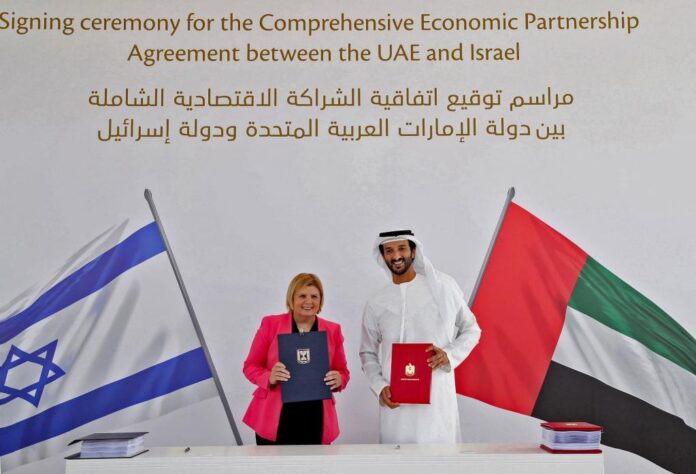“Historical”. It is the term used by Israel and the United Arab Emirates (UAE) to define the free trade agreement signed on Tuesday in a strategic step that consolidates their normalized relations in 2020.
“This is an important and historic agreement that will strengthen Israel’s economy and open new and exciting opportunities for all citizens,” said Israeli Minister of Economy and Industry Orna Barbibay, after signing Israel’s first free trade agreement in Dubai. Israel with an Arab country. Something that could not materialize after the signing of peace with Egypt (1979) and Jordan (1994).
Barbibay, who announced that they will “jointly eliminate barriers” and promote “comprehensive trade and new technologies”, praised the work of his Emirati counterpart, Abdullah bin Tuk Al Marie, and the Minister of State for Foreign Trade, Thani bin Ahmed Al Zeyoudi, who after the signing of the Comprehensive Economic Partnership Agreement proclaimed: “We have written a new chapter in the history of the Middle East. Our agreement will accelerate growth, create jobs and usher in a new era of peace, stability and prosperity in the entire region.”
“Our agreement can demonstrate to nations and governments around the world that cooperation and dialogue are the best way to turn challenges into opportunities,” said Al Marie. According to him, “it will create a new paradigm in the Middle East.”
Beyond the ceremonial words about “bridges between countries and peoples”, the agreement plans to increase the volume of trade to more than 10,000 million dollars annually in a five-year period and grants an immediate or gradual tax exemption in 96% of the bilateral trade concentrating basically in the field of agriculture, health and food. According to the emirate, the pact will mean an increase of 1,900 million dollars to its GDP in these five years.
According to the UAE-Israel Chamber of Commerce forecast, the number of Israeli companies working with or in the emirate, especially in Dubai, will approach 1,000 by the end of 2022 while bilateral trade will exceed $2 billion. The agreement also includes regulation on intellectual property rights and electronic commerce.
After the normalization of relations sponsored by the United States in 2020 in the so-called “Abraham Agreements”, the Emiratis and Israel signed numerous agreements in the economic, commercial, financial, technological and tourist fields with flights full of Israeli visitors to Dubai. Likewise, a joint fund has the mission of assisting small and medium-sized companies that tend to have much more difficulties in enjoying and even accessing the succulent cake of profits than large Israeli companies that have been operating in the Arab country for two decades.
In this way, the UAE continues to try to diversify its industry based especially on oil and gas. The UAE is interested in Israeli High Tech and its innovations, especially in the food and water sector, while attracting Israelis not only for its financial, logistical and commercial power or its luxury hotels and skyscrapers, but also for its leadership in energy, for example. modern and green The rich Persian Gulf country is an important enclave to do business not only in the region but also with South Asia and the Far East
“This agreement, the first of its kind with an Arab state, will strengthen the Israeli economy and open up exciting new opportunities for all Israeli citizens,” Foreign Minister Yair Lapid tweeted.
In Israel, not only the precedent of the pact with a nation in the area stands out, but also the fact that it was closed in just six months of negotiations. “Free trade agreements between countries usually take many years to sign,” Prime Minister Naftali Bennett said before revealing: “At the Sharm el-Sheikh summit about two months ago, Sheikh Mohamed bin Zayed and I agreed that what takes 5 years can also be done in a few weeks,” and we instructed the teams to work at top speed. And that’s exactly what happened.”
Israel has economic and trade agreements with Egypt and Jordan focused on the area of qualified industrial zones. A few days ago, the Israeli government approved the initiative to expand the commercial relationship with Egypt, including the modernization of the Nitzana goods border crossing or the increase in agricultural imports and exports. However, it still lacks a comprehensive free trade agreement with its neighbor and, until 1979, a great enemy, such as the one signed now with the new Arab partner.
Under the umbrella of the Abraham Accords, Israel normalized its relations with the UAE, Bahrain, Morocco and Sudan, although the process has not been completed with this African country due to its tumultuous internal events. Israel has strengthened commercial, economic and tourist contacts with Morocco and Bahrain, although, logically, the headlines and focuses were devoted to the agreements signed on security and defense.
The big question is whether Saudi Arabia will join the process of diplomatic normalization with Israel without there first being, as its traditional position marks, a solution to the conflict based on the creation of a Palestinian state. In statements to EL MUNDO, Israeli and Arab diplomatic sources rule out an official agreement in the short or medium term between Israel and Saudi Arabia despite the increasingly less discreet and more intense relations, motivated for years in the shadow alliance before its great common enemy Iran and intensified in recent weeks before the visit of US President Joe Biden to the region next June.
Conforms to The Trust Project criteria








